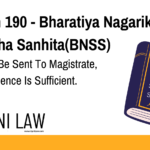Code:
Every offence shall ordinarily be inquired into and tried by a Court within whose local jurisdiction it was committed.
Explanation
Section 197 BNSS establishes the general rule of jurisdiction for conducting criminal inquiries and trials. It ensures that offences are investigated and prosecuted within the territorial limits where they were committed, allowing for efficient case management and ease of access to evidence and witnesses.
However, exceptions to this rule exist under special provisions of law, such as cases where:
- The offence was committed in multiple jurisdictions.
- A higher court assumes jurisdiction due to the gravity of the case.
- The law allows for transfer of cases for a fair trial.
Key Provisions:
- Primary Rule of Jurisdiction: Offences must be inquired into and tried in the court where they were committed.
- Ensuring Fair Trials: The provision ensures local accessibility to evidence and witnesses, reducing unnecessary delays.
- Exceptions: Certain offences may be transferred under legal provisions to a different court or jurisdiction for fairness or convenience.
Illustration
Example 1: Theft Case in a Specific City
A theft occurs in Mumbai.
- The trial will take place in a Mumbai court since the crime was committed there.
Example 2: Crime Spanning Multiple Jurisdictions
A fraudulent online transaction affects victims in multiple states.
- The case may be tried in any of the affected jurisdictions, or it may be transferred to a central location for efficient trial proceedings.
Example 3: Exception for High-Profile Cases
A terrorism-related offence occurs in a district but is transferred to a special court in the capital city for national security reasons.
- The higher court assumes jurisdiction due to the severity of the offence.
Common Questions and Answers
1. Where is an offence usually tried under Section 197?
- Answer: An offence is ordinarily tried in the court within whose jurisdiction it was committed.
2. Are there exceptions to this rule?
- Answer: Yes, exceptions exist where special laws or court orders allow for transfers to other jurisdictions for fairness, security, or convenience.
3. What happens if a crime occurs in multiple locations?
- Answer: The case may be tried in any of the locations where the offence occurred, or it may be transferred to a central jurisdiction for legal efficiency.
4. Can a case be transferred to another court?
- Answer: Yes, courts have the power to transfer cases under special legal provisions to ensure a fair trial.
Conclusion
Section 197 BNSS establishes the fundamental principle that offences should be tried in the jurisdiction where they were committed. This rule ensures efficient investigations, accessibility to evidence and witnesses, and fair trial proceedings. However, in exceptional cases, higher courts may intervene to change the jurisdiction for justice and convenience.








